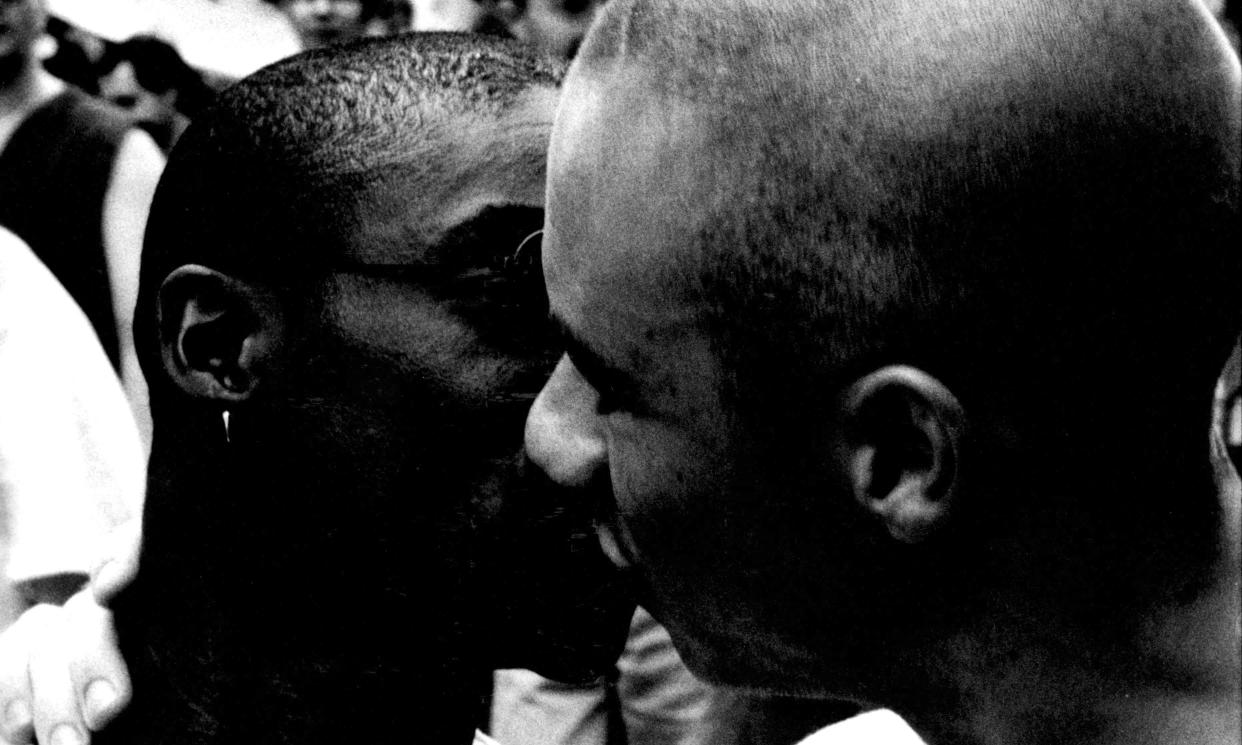Poem of the week: Simulacrum by Oluwaseun Olayiwola

Simulacrum
There wasn’t love but there was what love becomes —
(sheet-wrinkle.) (skin-dune.) (Arm-ropes lassoing
our neck-flesh with push-and-pull —, equal amounts;
the hurt convincing its shape is false, the relation:
the recorded moment (he likes to record) (to remember), not true) —
Then the film buffering…the unfinished triangle
your body sculpts on top of his.
Frustration. Yes. Rejection. Oh yes.
The colon’s ring hammering, waking up (not again, not
tonight). Tight. Loose. Bloodless (for now), dragging
a palm across the brick wall – now
blood (for now) streaming from you like scripture —:
spit of him landing atop of your eyelid, a puddle of need.
And there is freedom, there is intention to break your back in half
and call it what-you-asked-for, what our separateness
will not allow. Rattle of wooden slats (indentations
in the linen), this body you are finally inside of
being molded into the cushion’s canvas
by what desire has given him permittance to do tonight, tonight only —
He is not a perfect fit and that is perfect. He will not
stay the night. He will not stay. Hard
night. Leaking night. No fine point, needled stars.
The sky is a masculinity. He starts the car.
Likes to be called daddy. Needs to be called
something, anything. There is your obligation, your obliging. Call it
gratitude. Be
grateful. Give
thanks. Give thanks.
Oluwaseun Olayiwola is a Nigerian-American poet, choreographer and critic. Simulacrum is a carefully structured “page-poem”, embellished by some finer points of punctuation that reveal the narrator’s impulse to interrogate his thoughts. It embodies Olayiwola’s fusion of talents, and is a reminder that poetry is well served by critic-choreographer co-production. It’s the combination of an attention to the minutiae of language with a sense of the bigger flowing shapes it makes in the air that gives it life.
“There wasn’t love but there was what love becomes —”. This is an enticingly authoritative opening statement: who doesn’t want to know what love is and isn’t and what it sometimes becomes? In which direction will the speaker send us? Love poetry is a long-lived, heavily worked genre: queer love poetry is part of that tradition, but, if not always silenced, it has been muffled and narrowly boxed inside it. Now, if a queer poet has Olayiwola’s skill, passion and daring, they can re-launch reader expectations and alter the gravitational forces that bind us.
Having plunged into the recollection of sexual encounter, the first verse soon establishes details of physical imperfection, the wrinkled sheet, the possible desert of the “skin-dune”. The lovers’ combat begins (“Arm-ropes lassoing/ our neck-flesh with push-and-pull —, equal amounts…”) There is pain, “the hurt convincing its shape is false, the relation…” The intransitive “convincing” suggests a missing pronoun – us, you, me? Perhaps “the relation” itself is a false one. In the last line, the lover is introduced artfully via “the recorded moment (he likes to record) (to remember), not true)—”. The introduction is casual: the narrator’s conversation-with-self still keeps the other actor at bay.
The video (if that’s what is recorded?) seems marred by the “buffering” and the image of “the unfinished triangle” made by bodies not smoothly aligned, despite the “sculpting” metaphor. The poem consistently challenges any romantic expectations the reader or speaker might harbour. To that end, it’s a masterclass in the good old literary techniques, telling and showing. Contrasts of staccato and legato keep the “hurt” alive, while sensations are often registered as temporary. There is no blood (“for now”) but the narrator’s palm dragged across the brick wall means “now/ blood (for now) streaming from you like scripture —:” The simile suggests a preacher unstoppably pouring out a hellfire sermon.
Related: Poem of the week: Morfudd Like the Sun by Dafydd ap Gwilym
There’s no featherbedding, actual or metaphorical. As well as the “brick wall” there’s “the colon’s ring hammering”, “the rattle of wooden slats”, a puddle of spit on the speaker’s eyelid, and a night of leaking. The participants haven’t reached clear agreement on boundaries: “freedom” may amount to the “intention to break your back in half/ and call it “what-you-asked-for, what our separateness will not allow.” The sound of the word “permittance” is brisk and slightly chilly, as if “permission” would be too comfortable: however, this is the point at which the narrator makes some concession to “desire”. And the first line of the last verse dares a moment of celebration.
This is a terrific verse, in which contradictions blur in the narrative’s rapid pace. The speaker has no sooner said, “He will not/ stay the night” than the lovers are out under the stars, and “he” starts the car. A brief reference to the name he likes to be called and the fact he “Needs to be called/ something, anything” suggests hard-won empathy. The narrator defines his “obligation” and enacts the “obliging”. His imperatives to self are beautifully paced over the line-breaks, and the repetition of “Give/ thanks. Give thanks” summons the spirit of an end-of-sermon blessing, as if solemnising the earlier “scripture” reference. Gladitorial combat ends in an after-glow of benediction. Is the “simulacrum” better than the original event? There may still be questions, but for now a reader can only be grateful for the ringside seat.
Olayiwola has been a Ledbury poetry festival Young Critic, and Simulacrum won second prize in the 2022 Ledbury festival Poetry Competition. You can read the winning poems on Ledbury Poetry’s website and, if you can get along to the 2023 festival, running from 30 June to 9 July you’ll be able to hear all the 2022 winners performing their work. In the meantime, you can listen to the London-based artist reading another impressive poem, SE16. Olayiwola’s work in choreography-poetry fusion has been reviewed in the Dance Art Journal.


